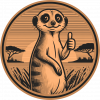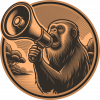Hi all! I wanted to open a discussion on a topic that I've been thinking about ever since I entered the job market-- how to get a software job in conservation. As someone who recently transitioned into a software engineer role at conservation NGO called Wildlife Protection Solutions after 4 years in commercial tech, I wanted to share some brief thoughts, tips, and resources from my experience. I found the job search process long and challenging, but so worth it in the end!
I'd love to hear about your experience finding a software job in conservation! Please respond to this discussion or feel free to start your own.
Finding the job
When I first started looking for a conservation software job, I struggled to find any listings at all on traditional job boards. There are pages of "software engineer" roles, but as soon as you add "biodiversity" or "conservation" to the beginning, the results disappear or are impossible to find among all the other non-conservation jobs.
I found that I had better results identifying the types of organizations that I wanted to work for, and then looking to see if they had postings. I applied for jobs (based in the US) as some of the following places:
- Universities and Research Institutions: Cornell Lab of Ornithology, UCSB, Yale Center for Biodiversity, Stanford Natural Capitol project, National Center for Ecological Analysis, Oak Ridge National Laboratory
- Biodiversity Data companies: GBIF, IUCN, Nature Metrics
- NGOs: Wildlife Protection Solutions, Rainforest Connection, World Wildlife Fund, Flora and Fauna
The WildLabs Inventory is a great place to find organizations working in conservation tech. Once you find an organization that interests you, you can go to these organizations' websites directly to look for software postings and follow them on LinkedIn.
Overall, the best place to find these jobs though is WildLabs.net! Be sure to check their resources page daily for job postings, as conservation jobs tend to go fast.
Gaining the Relevant Skills
For software developers trying to move into conservation tech from another field, it can be daunting to feel like you don't have any experience with conservation or wildlife-focused tech. There are a couple things that I did to try to build out my resume, as someone moving from commercial tech into conservation:
- Nature-focused coding challenges: I participated in a coding challenge hosted by the MoveApps platform. It was a great way to get some experience and meet others interested in conservation tech. I found this challenge on WildLabs. There is also a site called FruitPunch.ai that hosts team challenges using AI for good. They often have nature-themed challenges that you apply to join, even if you don't have any AI experience. They need people with software experience, not just AI engineers, but this could be a good way to learn some AI skills as well.
- Contributing to Open Source code: Another great way to get some conservation experience is to contribute to open source projects. Open Sustainable Technology provides a directory and analysis of the open source ecosystem in the areas of climate change, sustainable energy, biodiversity and natural resources. There is also an Open Source group here on WildLabs that you can join!
- Create your own projects: Building out your GitHub with some sample projects is a great way to get some new technical skills and demonstrate your commitment. There are tons of free online resources for learning topics in software. I found that coding along with YouTube videos or classes and implementing your own version of the lesson is the best way to learn a new skill via online learning.
Getting the Job
There are tons of resources out there related to preparing for a software coding interview. Software jobs often have 4+ rounds of interviews, including the dreaded "technical" interview, which will often require you to code solutions to problems on the spot-- which can be daunting while sharing your screen over a zoom call or standing in front of several interviewers. The best resources I found to prepare for technical interviews were:
Cracking the Coding Interview by Gayle Laakmann McDowell
This is a book full of software basics with sections for each of the popular languages and topics (C++,, Java, Databases, Multithreading, etc). This was a great way to brush up on technical content. If the job posting mentions specific languages or skills, I would look in this book to find practice problems and overviews. It also contains real interview questions from some of the top tech companies in the world.
LeetCode
This is a practice problem website. It's this is great to practice the kind of problems that are typically given in a technical interviews. You can sort problems by topics (arrays, for loops, sorting algorithms, string manipulation, etc.) and by difficulty level. I found that Medium level problems were the best for someone looking for an early career software job (I had about 3 years of experience at the time). I started with easier problems and tried to get faster at solving them, and then moved to more difficult ones. For me, the time crunch is one of the hardest parts of technical interviews, so practicing with LeetCode was really useful.
WildLabs
This site is a great way to find conservation resources and learn more about conservation topics. I found that being prepared to talk about your passion for conservation is just as important as your technical skills for many companies! You can also learn more about conservation topics and challenges by listening to podcasts like Mongabay Explorers, Ologies, and others that focus on specific topics that interest you.
Staying Patient
Finding a job in conservation can be challenging, especially as a software engineer. Many of the organizations that we often thing of when we think of conservation do not have large software teams, so are not often hiring for those roles. However, as technology continues to change the face of conservation, you can be sure that more jobs like this will become available.
It took my several years to find a software job in conservation at Wildlife Protection Solutions, and I am so glad that I persevered. Finding a job that makes me excited to go to work everyday, with co-workers and leadership who are dedicated to making an impact in wildlife conservation, was worth the wait!
Don't get discouraged if the search takes time. Remember, every coding challenge you take on or project you complete brings you one step closer to your goal. Consider joining and participating in online conservation communities like WildLabs to stay engaged and motivated during the search. Conservation is a relatively small field, so networking can play a big role as well! Joining online meet-ups, attending conferences, or even participating in a WildLabs discussion can help you make connections.
I hope you found this useful, and please comment any questions, comments or resources. I'd love to hear from you about how you transitioned into a software job in conservation!





